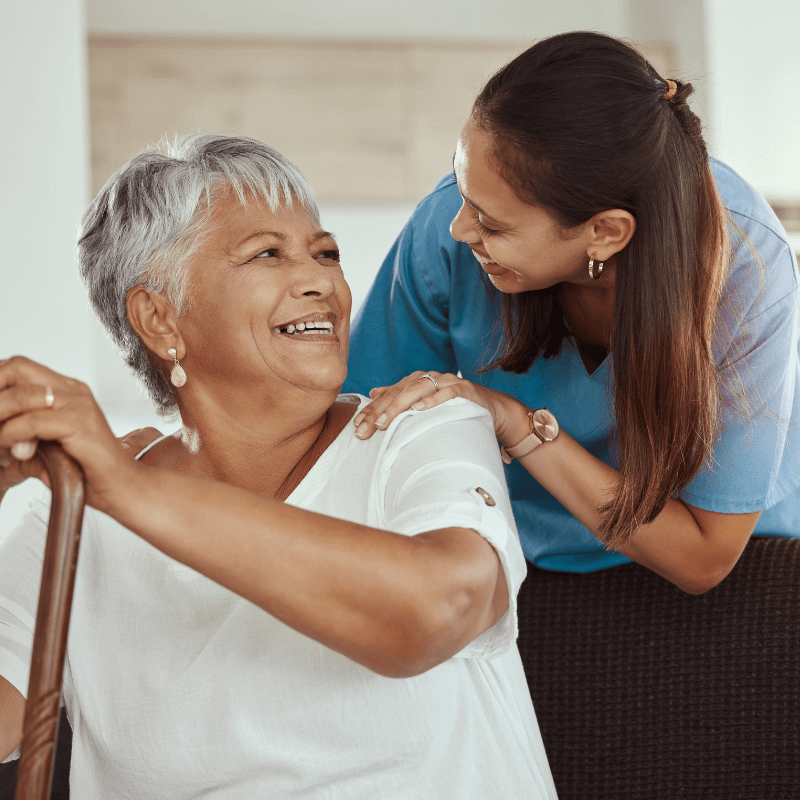The Essential Function of In Home Care Givers in Giving Companionship and Health Checking for Aging Liked Ones
At home caregivers serve an important feature in the lives of aging people, using both companionship and important health tracking. Caregivers are experienced at observing and managing health and wellness conditions, thus playing a crucial duty in the very early detection of prospective concerns.
Importance of Friendship
Companionship plays an essential function in the wellness of aging loved ones, offering as an essential pillar of mental and emotional health. As people age, they commonly experience boosted isolation due to elements such as mobility restrictions, the loss of close friends, and decreased social interaction. This isolation can cause sensations of solitude and clinical depression, which can negatively affect general health.
At home caregivers supply vital companionship, promoting meaningful communications that promote psychological stability. These caretakers use not just physical support but likewise social communication, which is important for mental well-being. Via conversation, shared activities, and companionship, caretakers assist to relieve sensations of isolation, making aging people really feel valued and attached.
In addition, the existence of a friend can motivate elders to take part in boosting activities, such as pastimes or light exercise, which are very important for cognitive health. By nurturing relationships and providing emotional support, in-home caretakers play an indispensable duty in improving the high quality of life for maturing enjoyed ones. Ultimately, the benefits of companionship expand past emotional wellness, adding to improved physical well-being and a higher sense of function in every day life.
Wellness Tracking Obligations
Just how can family members make certain that their aging enjoyed ones obtain the proper wellness care they require? One efficient method is to involve at home caregivers that specialize in health tracking obligations. These professionals play a crucial duty in overseeing the clinical requirements of seniors, ensuring that they stick to prescribed treatment strategies and medications.
At home caregivers are educated to identify adjustments in health standing, such as fluctuations in blood stress, weight, and general physical condition. They thoroughly track important signs and report any type of concerning growths to family participants or doctor, promoting timely treatments. Furthermore, caretakers assist manage consultations, making sure that seniors participate in routine check-ups and testings, which are critical for stopping issues.
Additionally, caregivers inform family members regarding the relevance of nutrition and hydration, aiding in meal preparation and preparation customized to specific wellness requirements. By recording daily wellness monitorings, they offer valuable understandings to health care professionals, cultivating a collective approach to care.
Eventually, in-home caretakers not only boost the lifestyle for aging enjoyed ones yet likewise empower families with the details required to make educated health care choices. Their visibility is important in maintaining wellness and health in the golden years.
Psychological Support for Elders
In addition to dealing with physical health needs, at home caretakers likewise provide vital emotional assistance for elders. At home caregivers play an important duty in minimizing these psychological problems by providing companionship and alert listening.
Additionally, caretakers are trained to identify indicators of emotional distress, allowing them to step in appropriately and provide necessary comfort. They can facilitate links with family participants and pals, making certain that elders keep their social media networks. This psychological support cultivates a feeling of belonging and purpose, which is necessary for psychological health.
At home caregivers not just assist with everyday regimens however also develop a caring atmosphere where seniors feel valued and recognized. By focusing on psychological well-being alongside physical health and wellness, these caretakers contribute substantially to the overall lifestyle for maturing people, allowing them to navigate their later years with dignity and pleasure.
Enhancing Daily Living Activities
A vital aspect of in-home caregiving is enhancing daily living activities for senior citizens, which includes a selection of jobs that promote self-reliance and general lifestyle. At home caretakers play a vital duty in helping elders with essential activities such as bathing, dressing, grooming, and meal preparation. By supplying assistance in these locations, caretakers make it possible for elders to maintain their self-respect while ensuring their personal care needs are satisfied.
Furthermore, caregivers can assist seniors participate in physical tasks customized to their capacities, advertising flexibility and physical wellness (ndis plan manager). This could consist of straightforward workouts, strolls, or stretching regimens that boost toughness and adaptability. Social engagement is equally vital; caretakers can assist in hobbies, video games, or outings that boost cognitive function and emotional health

Building Trust With Families
Developing a strong foundation of trust with households is important for in-home caregivers, as it promotes open interaction and shared respect. Trust is vital in making certain that caregivers can effectively satisfy the demands old enjoyed ones while minimizing family members issues concerning their wellness. This relationship is constructed published here with constant, clear communications that focus on the family's values and preferences.
Caretakers should take part in normal, honest conversations regarding care plans, attending to any type of concerns or concerns that occur. Actively paying attention to households and incorporating their input into daily routines demonstrates commitment to personalized care. Caregivers must maintain compassion, reliability, and expertise, as these top qualities reassure households that their liked ones are in qualified hands.
Developing trust fund likewise includes valuing the personal privacy and dignity of the specific getting treatment. By maintaining privacy and being sensitive to the family's dynamics, caregivers can develop a safe environment for open discussion. Eventually, when caretakers construct trust with households, it leads to enhanced partnership, improved treatment outcomes, and a more favorable experience for every person involved. Depend on is the cornerstone of reliable caregiving and is important for fostering lasting connections with households.
Final Thought

In-home caretakers offer a critical function in the lives of aging people, offering both companionship and vital health and wellness surveillance. One efficient approach is to involve in-home caregivers who specialize in health and wellness monitoring duties.In addition to attending to physical health requirements, at home caregivers also provide vital emotional support for elders.In-home caretakers are important in promoting the well-being of maturing people via companionship and health monitoring. Ultimately, the important contributions of in-home caregivers lead to enhanced physical and psychological important site health and wellness outcomes for maturing loved ones.